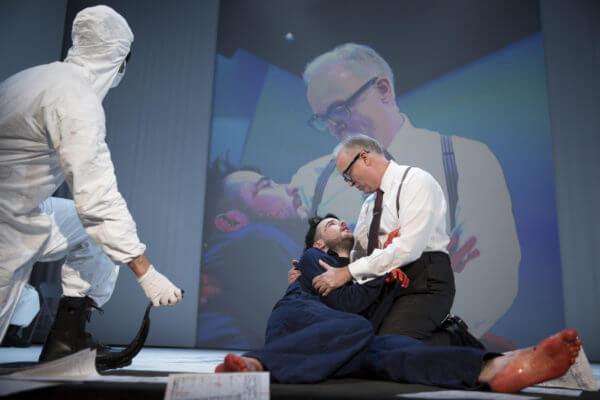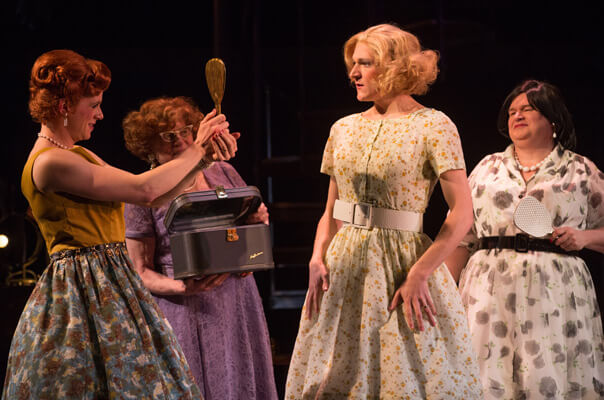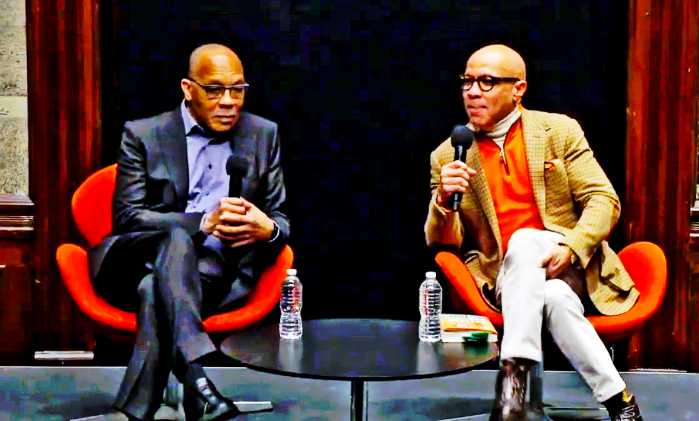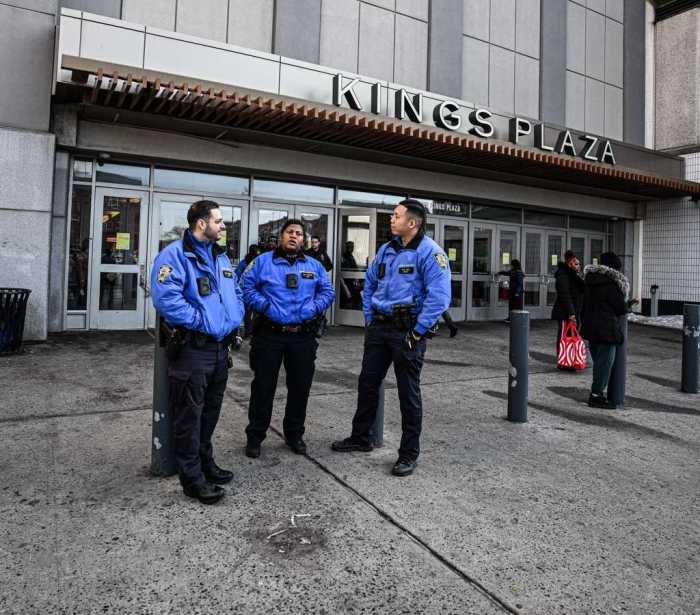Tom Sturridge and Reed Birney in Robert Icke and Duncan Macmillan’s adaptation of George Orwell’s “1984.” | JULIETA CERVANTES
George Orwell’s “1984” has been read as a dark satire by at least three generations of high school students, and, like the best of this genre, it affords each reader the chance to find harrowing parallels to his or her own time.
In today’s world of “alternative facts” and daily accusations of “fake news,” Orwell’s classic seems to take direct aim at the Trump administration’s efforts to manipulate the truth while demanding fealty with threats of a hail of Twitter retribution for those who are disloyal.
Orwell’s story tells the tale of Winston Smith, an unprepossessing functionary in the ominously named Ministry of Truth whose job is to rewrite history in the “newspeak” that turns truth upside down. He also has to “unperson” people the Ministry wants to eliminate from history. When Smith joins the Resistance that seeks to overturn the party and reestablish objective reality, he is deceived and destroyed.
Three earnest but unsatisfying plays
In adapting the novel for the stage, writers and directors Robert Icke and Duncan Macmillan have created a highly theatrical, often expressionistic interpretation of the tale. Through assaultive lighting and sound, they effectively create the dangerous and terrifying world Smith lives in, where thought crimes are punishable by disappearance. The writers use clever techniques such as repeating scenes with minor changes to build tension and convey Smith’s fear and frustration at feeling like the only one who sees what’s going on. When he finds a kindred soul in a young woman, Julia, they seem to escape the oppression for a brief moment, only to be duped and undone.
But all is not bleak, since the authors created a framing device in which a book club, having found Winston’s diary, looks back at the events of a century ago and celebrates the return of a rational world.
For all its impressive theatricality, however, the production stays at a cool remove from the audience. Techniques such as showing Winston and Julia in their haven on video rather than on the stage distance the action from the audience. The intention seems aimed at conveying the point that even when they think they’re safe from Big Brother’s watching, they’re not, but that cerebral conceit comes at the cost of emotional identification with the characters. That is ultimately what makes this production less engaging — concept overrides connection, making the piece feel disjointed.
What works are the performances of the three main characters. Tom Sturridge is compelling as Winston, and his struggle is visceral, particularly when he is taken to the ominous Room 101 and tortured. Olivia Wilde is often quite moving as Julia, though the character is not fully developed. Reed Birney delivers another exceptional performance as O’Brien, the party representative who seems to enroll Winston in the Resistance and then turns the tables on him and becomes the torturer. What makes Birney’s performance so harrowing is that his O’Brien is fully committed to the party and his work and seems to care about “saving” Winston. The question of whether that makes him evil is for the audience to decide.
If more of the production delivered the visceral impact of Birney’s committed performance, this “1984” would leave audiences emotionally drained rather than merely intellectually challenged. That’s one thing totalitarian regimes know well: capture the emotions and the supposed rational mind can be easily manipulated.
It’s summer, the season of vanity productions. That can be the only explanation for the disappointing new musical “Lili Marlene.” The tale of a Jewish cabaret singer’s escape from the Nazis with the help of a noble count, with whom she falls in love, is an unfortunately amateurish affair.
The book, music, and lyrics are by Michael Antin, each as unfortunate as the next. The book is a hodgepodge of exposition without any character development and too many subplots — the lesbian cabaret owner, the brother in the Resistance, the subversive attempts to thwart the Nazis, not to mention the central love story. The lyrics of the songs are unsophisticated with forced rhymes that are telegraphed and painfully predictable. The music is banal and the songs often seem inappropriate to the action and inconsistent with the story’s themes.
There is potentially a compelling show in all this. Antin touches on our belief systems and how they are challenged, and looks at the randomness and irony in the singer, Rosie Penn, having her fate held in the hands of one man. The intriguing and tense scene at the end of the show when she is saved is the only truly dramatic moment in the piece — and the merest hint of what this show might have been. Alas, for “Lili Marlene,” it was too little and far too late.
“A Real Boy” is a play that sounds interesting as a concept. What would happen if you engineered a reverse Pinocchio where the boy became the puppet? In the hands of playwright Stephen Kaplan, unfortunately, the execution is so rambling and disjointed that the idea bogs down almost from the outset.
The story concerns a kindergartener who is the adopted son of two marionettes. When his teacher suspects the boy is abused, she refuses to return him to his parents and holes up in the classroom as controversy swirls around her. When the boy starts to grow strings and turn into a puppet himself, the teacher’s judgment is challenged. A politician tries to make hay out of the situation, but it all falls apart in the end.
Kaplan attempts to use his conceit to make points about parenting, politics, and individuality, but the story is so convoluted and confused that it succeeds neither as absurdist comedy nor social commentary. In trying to pack so many ideas into the play, none is fully developed.
Under the direction of Audrey Alford, the staging is clumsy and confusing in 59E59’s tiny theater and the play lacks a point of view. Worse yet, the puppetry, a central element of the show, is unsophisticated and frustrating — and ends up feeling like a gimmick. With all the wonderful, expressive puppetry seen in recent productions, this is a major miss.
The concept inevitably invites comparison to Ionesco’s masterpiece “Rhinoceros,” an absurdist critique of fascism’s rise that for all its comedy has a focus that “A Real Boy” lacks. In trying to do too much, Kaplan’s play achieves nothing, finally strung up by its own concept.
1984 |Hudson Theatre, 139 W. 44th St. | Through Oct. 8: Mon-Wed. at 7 p.m.; Fri.- Sat 5 & 9 p.m.; weekend dates vary Sep.-Oct. | $35-$149 at telecharge.com or 212-239-6200 | One hr., 40 mins., no intermission
LILI MARLENE | St. Luke’s Theatre, 308 W. 46th St. | Through Oct. 10: Tue. at 7 p.m. | $20-$99 at telecharge.com or 212 239-6200 | Two hrs., 10 mins., with intermission
A REAL BOY | 59E59, 59 E. 59th St. | Through Aug. 27: Tue.-Sat. at 7:30 p.m.; Sat. at 2:30 p.m.; Sun. at 3:30 p.m. | $25 at 59e59.org or 212-279-4200 | Two hrs., with intermission




































